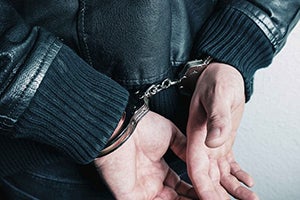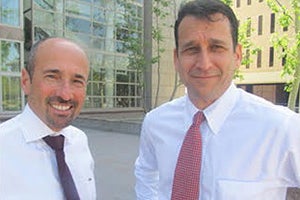Review of PC 32 Being An Accessory To a Felony Crime
California Penal Code 32 PC makes it a crime to harbor, conceal, or aid another person when you know they have committed a felony crime, and you acted to protect them from arrest, trial, conviction, or sentencing.

PC 32 is commonly known as “accessory after the fact” and essentially involves providing some type of aid to someone that has committed a felony.
After they have completed their felony offense, you did any of the following:
- conceal,
- hide,
- help them to escape arrest,
- help them financially,
- provide false alibi,
- drive getaway car,
- harbor, or
- help them in any way.
If you knew of their illegal conduct, you may be guilty of an accessory after the fact crime.
PC 32 accessory after the fact crime is a California “wobbler,” meaning the prosecutor can file the case as either a misdemeanor or felony crime.
Our Los Angeles criminal defense attorneys are providing readers a more detailed review below.
Definition of PC 32 Accessory After the Fact
California Penal Code 32 PC contains the relevant language defining this crime:
- “Any person who, after a felony was committed, harbors, conceals or aids a principal in such felony, with the intent they may avoid or escape from arrest, trial, conviction or punishment, having knowledge they had committed such felony or charged a felony or convicted thereof, is an accessory to such felony.”
In other words, if you aid a perpetrator of a felony by helping them avoid or escape authorities, then you can be held criminally liable as an accessory after the fact pursuant to Penal Code Section 32 PC.

The issue with accessory after the fact is simple. It is a serious offense of California law that can happen when a person commits a simple or innocent seeming action.
It may be in your nature to help a friend or a loved one out if they seem to be in trouble.
However, if their "trouble" arises because they have committed criminal activity, you could be found guilty as well after having done nothing more than offered shelter or aid to someone seemingly in need.
Related PC 32 accessory after the facts crimes include Penal Code 182 conspiracy, and Penal Code 664 attempted crimes.
Difference between accessory after the fact and aiding and abetting crimes
California law does make a crucial distinction between PC 32 accessory after the fact and PC 31 aiding or abetting crimes.
The line between the two can seem very thin. What's the difference?
Aiding and abetting under California Penal Code 31 states that “any person who helps commit a crime is guilty.” The difference is subtle but important.
Accessory after the fact means that you helped someone who has committed a crime to avoid arrest after the crime itself. Aiding and abetting refers to actual participation in the crime at hand.
Standards of Proof for an Accessory After the Fact Crime
How does the prosecution demonstrate that someone has committed a Penal Code 32 PC accessory after the fact crime?
To obtain a conviction, the prosecution must show the following elements (CALCRIM 440) of this type of criminal activity:
- someone committed a felony or was facing felony charges,
- suspected accessory knew about the other crime, or
- knew they were charged with or convicted of a felony,
- after felony was committed or charges, alleged accessory aided, concealed, or harbored the other criminal,
- suspected accessory did this to help the other criminal avoid the consequences of their crime, such as arrest, trail, conviction, and punishment
An accessory after the fact crime can take many forms, depending on the nature of the principal crime.
Example
For example, a person acting as an accessory after the fact could aid the principal criminal in fleeing after the crime, in destroying evidence relating to their crime, in covering up for them, or by helping them hide.
Factors considered by prosecutor
To convict someone of accessory after the fact, the prosecution will consider many factors relating to the defendant and the alleged crime. These factors include:
- whether the defendant was at the scene of the crime;
- the proximity of the defendant to the scene of the crime;
- the relationship between the defendant and the principal criminal;
- the extent of the defendant's knowledge relating to the principal crime.
Penalties for Violating Penal Code 32
In California, accessory after the fact is a ‘wobbler' charge. That means that the prosecution can file it as a felony or a misdemeanor. Their decision is based on the specific facts of the case and defendant's criminal record.

If you receive a conviction for the crime, its filing will affect the penalties you face. If the crime is a misdemeanor accessory after the fact, the usually associated penalty is:
- up to one year in county jail time,
- a maximum fine of $5,000,
- summary probation.
If this crime is a felony, the penalties increase. You could face:
- between 16 months and 3 years of county or state prison time,
- a fine of up to $5,000,
- formal probation.
Strategic Defenses for an PC 32 Accessory After the Fact Crime
The strategy that our experienced legal team will pursue depends on the specifics of your situation. There are many potential legal defenses for this crime, some of which are:
- Lack of Knowledge: We might be able to argue that you did not know the principal criminal had, in fact, committed a crime.
- No Felony Crime: Alternatively, we might be able to demonstrate that the principal crime was not felonious.
- No Intent: As an intent to help the principal avoid the consequences of their crime is key to the accessory crime, our attorneys may show that you did not have the intent to help the principal avoid arrest.
- Duress or Coercion: we might be able to argue that you only acted as an accessory because the principal threatened or bribed you to do so.
- False Accusation or Mistaken Identity: Finally, we might attempt to show that you are a victim of a false accusation.
If you are accused of violating California Penal Code 32 accessory after the fact law, you might have believed you were just doing a harmless act of helping a friend.

However, these are serious charges punishable by severe consequences. This means you will need a skilled defense lawyer on your side.
We might be able to negotiate wit the prosecutor to avoid the formal filing of charges through prefiling intervention.
At Eisner Gorin LLP, we have worked hard for years to defend those accused of accessory after the fact.
Our law firm is located at 1999 Avenue of the Stars, 11th Fl., Los Angeles, CA 90067. Our main office is located in the San Fernando Valley at 14401 Sylvan St #112 Van Nuys, CA 91401.
For more information, contact our law firm for a free immediate response at (877) 781-1570.

 If you have one phone call from jail, call us! If you are facing criminal charges,
If you have one phone call from jail, call us! If you are facing criminal charges,